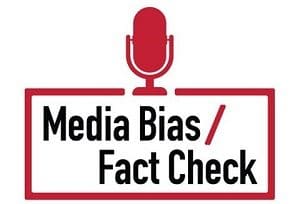LEFT-CENTER BIAS
These media sources have a slight to moderate liberal bias. They often publish factual information that utilizes loaded words (wording that attempts to influence an audience by appeals to emotion or stereotypes) to favor liberal causes. These sources are generally trustworthy for information but may require further investigation. See all Left-Center sources.
- Overall, we rate Hong Kong Free Press (HKFP) as Left-Center biased due to editorial perspectives moderately favoring the left. We also rate them as high in factual reporting due to the proper sourcing of information and a clean fact-check record.
Detailed Report
Bias Rating: LEFT-CENTER
Factual Reporting: HIGH
Country: Hong Kong
MBFC’s Country Freedom Rank: LIMITED FREEDOM
Media Type: Newspaper
Traffic/Popularity: Medium Traffic
MBFC Credibility Rating: HIGH CREDIBILITY
History
Founded in 2015 in response to concerns over declining press freedom in Hong Kong, the Hong Kong Free Press (HKFP) is a non-profit English-language newspaper. Its mission is to provide credible and comprehensive news coverage on Hong Kong affairs, emphasizing impartiality and ethical journalism. In 2022, HKFP partnered with The Guardian for joint reporting efforts. Hong Kong Free Press (HFKP) is headquartered in Kennedy Town, Hong Kong,
Read our profile on Hong Kong’s media and government.
Funded by / Ownership
Hong Kong Free Press (HKFP) is a not-for-profit company, limited by guarantee, without shareholders. Tom Grundy, a British multimedia journalist, founded it. HKFP’s revenue primarily comes from reader contributions, advertising, and content syndication.
In 2022, HKFP received a grant from Google’s News Equity Fund aimed at supporting its reporting on underrepresented communities in Hong Kong. Additionally, HKFP has a partnership with ProQuest for news article re-syndication and a unique funding arrangement with the Fall River Marksmen Football Club.
Analysis / Bias
Background on Hong Kong’s Politics: Hong Kong was handed over to Chinese sovereignty in 1997 under the “One Country, Two Systems” policy to ensure it kept its autonomy and distinct legal system. In recent years, concerns have arisen about Beijing’s influence over Hong Kong’s governance and the erosion of its freedoms, leading to a new national security law (NSL) in 2020. Currently, Hong Kong is split into the pro-democracy camp, seeking more democracy and human rights, and the pro-Beijing camp, which supports the policies and objectives of the central Chinese government.
HKFP advocates for democratic freedoms, human rights, and the rule of law in Hong Kong, aligning with Western liberal values. HKFP critically reports on the Hong Kong government and Beijing’s influence, especially concerning the National Security Law. For example, the article “HKFP Yum Cha: Democrat Emily Lau Recalls Early Morning Visit from Hong Kong national security police” contains emotionally loaded language indicating a critical stance towards Hong Kong’s national security police.
Similarly, “Lawyer Michael Vidler reflects on 19 years of equal rights advocacy in Hong Kong, and his reasons for leaving” criticizes the Beijing-drafted national security law and its effects on Hong Kong’s legal and social fabric. The articles convey concern and opposition to the law and Beijing’s influence. The article mentions increased surveillance and intimidation, including personal attacks from state-controlled media, as factors influencing Vidler’s decision to leave Hong Kong.
HKFP also supports LGBTQ rights, as seen in their coverage of equal rights issues, such as the article “Denial of equal rights for Hong Kong’s gay citizens dovetails with China’s human rights playbook” discussing discrimination and inequality in the region.
Regarding sourcing, HKFP sources information from various outlets, including peer-reviewed academic journals like International Organization, factually mixed sources like The South China Morning Post and The Guardian, and pro-Beijing media such as tkww.hk and republishes AFP articles. Although they may occasionally rely on sources who have failed fact-checks, the Hong Kong Free Press has never failed a fact-check and is frequently used as a resource by fact-checkers on matters concerning Hong Kong.
Failed Fact Checks
- None in the Last 5 years. They are used by fact-checkers as a resource.
Overall, we rate Hong Kong Free Press (HKFP) as Left-Center biased due to editorial perspectives moderately favoring the left. We also rate them as high in factual reporting due to the proper sourcing of information and a clean fact-check record. (M. Huitsing 12/27/2023)
Source: https://hongkongfp.com/
Last Updated on December 27, 2023 by Media Bias Fact Check
Do you appreciate our work? Please consider one of the following ways to sustain us.
or
Left vs. Right Bias: How we rate the bias of media sources


